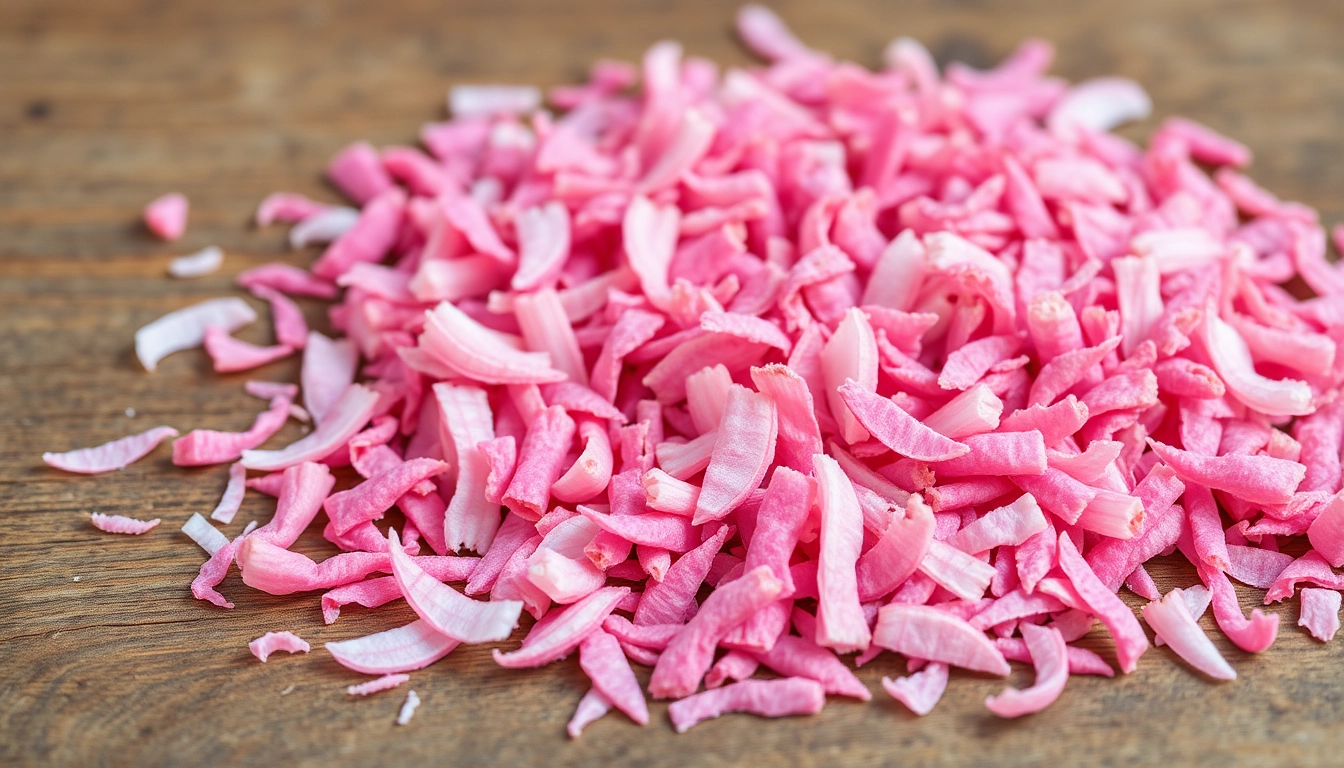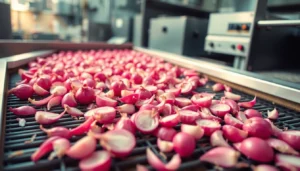Understanding Dehydrated Pink Onion: Processing and Quality Standards
Dehydrated pink onion, a versatile and flavor-rich ingredient, has gained significant popularity in the food industry due to its convenience, extended shelf life, and concentrated taste. As a specialist manufacturer and exporter of authentic food products, Spice Nest emphasizes the importance of adhering to strict processing standards to ensure the highest quality for dehydrated pink onion. The first step in maintaining product excellence involves understanding the various dehydration methods available.
Overview of Dehydration Methods for Pink Onions
Several techniques are employed in the dehydration process for pink onions, each suitable for different scales, quality requirements, and end-use applications. The most common methods include spray drying, drum drying, oven drying, and freeze-drying.
- Spray Drying: Involves atomizing onion juice or pieces into a hot chamber, rapidly removing moisture to produce a fine powder. This method is ideal for producing dehydrated onion powders used in spices and flavoring.
- Drum Drying: Uses a heated rotating drum where onion paste is spread thinly, evaporating moisture and forming flakes that can be milled into powder. It yields a more textured product suitable for seasoning blends.
- Oven Drying: Dehydrates onions through controlled hot air circulation, suitable for small-scale or artisanal production, offering control over moisture content.
- Freeze-Drying: Preserves more of the original flavor and nutrients by sublimating ice directly into vapor under low pressure, though it is more expensive and typically used for high-value products or specialty applications.
Choosing the optimal method depends on factors like production volume, desired product characteristics, and cost considerations.
Quality Assurance and Certification for Dehydrated Pink Onion
Ensuring the safety, purity, and consistency of dehydrated pink onion requires rigorous quality control and adherence to international standards. Certified suppliers like Spice Nest maintain certifications such as ISO, HACCP, and organic certifications, which underpin their commitment to quality.
Furthermore, comprehensive testing for microbial contamination, pesticide residues, heavy metals, and foreign matter is conducted regularly. Advanced laboratory facilities and strict supplier audits help uphold these standards, instilling confidence among global buyers.
Differences Between Dehydrated and Fresh Pink Onions in Culinary Uses
While fresh pink onions are prized for their crisp texture and vibrant flavor, dehydrated pink onions offer unique advantages and some limitations. Dehydrated forms concentrate flavors and provide long shelf life, making them ideal for powdered seasoning, instant mixes, and processed foods. Conversely, fresh onions are preferred for raw applications and dishes requiring textural contrast. Recognizing these differences helps culinary professionals and manufacturers select the right form for their specific recipe or product development.
Benefits of Using Dehydrated Pink Onion in Food Manufacturing
Flavor Concentration and Enhancement in Prepared Dishes
Dehydrated pink onions retain and intensify their distinctive sweet and aromatic profile when properly processed. Because of their concentrated flavor, they serve as excellent natural flavor enhancers in soups, sauces, snack foods, and ready-to-eat meals. The use of dehydrated onion powder can reduce the need for additional seasoning, simplifying ingredient lists and maintaining consistent taste profiles across batches.
Extended Shelf Life and Preservation Benefits
The removal of moisture significantly extends the shelf life, allowing manufacturers to stock large quantities without spoilage concerns. Dehydrated pink onions, protected by vacuum-sealed or moisture-proof packaging, are resilient to pests and microbial growth, reducing wastage and ensuring year-round availability.
Cost-Effectiveness and Storage Advantages for Bulk Buyers
Compared to fresh onions, dehydrated pink onion is more cost-effective on a large scale due to lower transportation and storage costs. It occupies less space, requires no refrigeration, and minimizes spoilage losses. Wholesale buyers and food service providers benefit from consistent supply and lower logistics expenses, leading to better profit margins.
Application Tips for Incorporating Dehydrated Pink Onion
Optimal Rehydration Techniques for Cooking Applications
To achieve optimal texture and flavor, it is essential to rehydrate dehydrated pink onions adequately. A common approach involves soaking the powder or flakes in warm water for 10-15 minutes, stirring occasionally to facilitate even hydration. For recipes needing finer consistency, blending the rehydrated onions into a paste enhances integration into sauces or marinades.
In dry applications, such as seasoning blends, light toasting the dehydrated onion can boost aroma. Adjust water quantities based on recipe requirements; typically, 1 part dried onion to 2 parts water suffices for rehydration.
Ideal Recipes and Product Ideas Featuring Dehydrated Pink Onion
Dehydrated pink onion is versatile across numerous culinary formats. Examples include:
- Spice blends for curries and barbecue rubs
- Instant soup mixes
- Processed snack products like onion-flavored crisps
- Seasoned rice or grain dishes
- Create onion powders to be used as toppings for pizza, salads, or burgers
Common Challenges and Troubleshooting in Usage
Some challenges include clumping during rehydration, flavor dilution, or inconsistent moisture absorption. To mitigate these issues, ensure proper storage to prevent moisture ingress, use sieves or grinders for uniform powder texture, and calibrate rehydration water quantities based on product specifications. Additionally, quality of dehydrated onions, including particle size and moisture content, greatly influences usability.
Market Trends and Consumer Preferences for Dehydrated Pink Onion
Growing Demand in Organic and Natural Food Sectors
The global shift toward organic, clean-label foods has propelled demand for dehydrated pink onion processed without artificial preservatives, pesticides, or additives. Consumers increasingly prefer natural flavor enhancers over synthetic MSG and chemical flavorings. As a result, organic-certified dehydrated pink onions have witnessed rising popularity in health-conscious markets.
Regional Popularity and Export Opportunities
While traditionally favored within Indian cuisine, dehydrated pink onion is expanding rapidly into international markets, including the Middle East, Europe, and North America. The product’s preserved flavor and convenience appeal to food manufacturers, restaurant chains, and retail grocery brands aiming to meet diverse regional tastes.
Future Forecasts and Innovation in Dehydration Technologies
Advancements such as microwave vacuum drying and osmotic dehydration could further enhance product quality, reduce energy consumption, and preserve more nutritional content. The trend toward functional foods also opens opportunities for fortification, combining dehydrated pink onion with other superfoods for novel health-oriented ingredients.
Choosing the Right Supplier for Dehydrated Pink Onion
Certification, Quality Controls, and Sourcing Transparency
Partnering with a reliable supplier like Spice Nest ensures access to products that meet stringent quality standards, certified by ISO, HACCP, and organic certifications. Transparent sourcing practices and traceability from farm to packaging guarantee authenticity and safety, enabling confidence in brand reputation.
Pricing, Packaging Options, and Bulk Order Considerations
Suppliers offering competitive pricing, flexible packaging (bulk sacks, retail pouches), and scalable order quantities provide more value for wholesale buyers. Proper packaging—vacuum-sealed or nitrogen-flushed—is crucial for maintaining product integrity over extended periods.
Customer Support and After-Sales Services for Wholesale Buyers
Superior after-sales support, timely delivery, and assistance with technical specifications help build enduring partnerships. Training on usage, responsive communication channels, and problem-solving support are key indicators of a dependable supplier.


